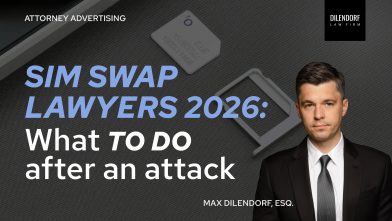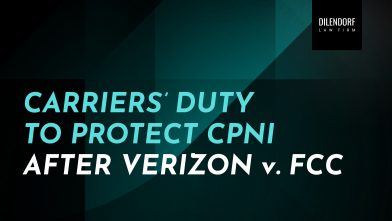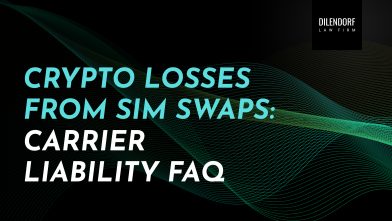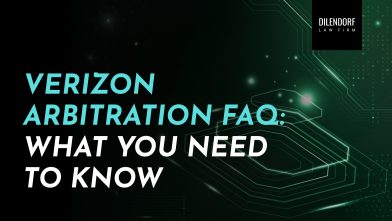SIM-Swap: What Carriers Must Tell You (and When)
When a SIM swap or port-out happens, the carrier’s notices and internal records are your earliest, most objective evidence.
They show when the request was made, how it was authenticated, what the carrier told you (and when), and whether any account-lock was available or enabled.
If your crypto or funds were later stolen—from a self-custody wallet (MetaMask, Phantom) or a regulated exchange—those artifacts become the backbone of your case.
In arbitration, the decision maker isn’t guessing; they’re reconstructing a timeline: service loss → SIM/port change → login/reset events → withdrawals.
Carrier notices and logs anchor that timeline and help prove causation—that control of your number enabled password resets, SMS 2FA interception, or account recovery into your wallet or exchange.
They also speak to carrier compliance with required pre-change notifications and authentication, and they document your own reasonable steps to secure the account and respond quickly.
Practically, this evidence gives you leverage across the board: it helps exchanges escalate your claim, supports law-enforcement reports, and frames arbitration arguments about what should have happened versus what actually happened.
Preserve every notice and demand written confirmation from the carrier now; if you wait, logs roll off, memories fade, and your best proof disappears.
Dilendorf Law Firm has represented SIM-swap victims nationwide since 2019 and arbitrated 100+ crypto-cyber matters. Below is your playbook: what rules apply, what to request, and how to keep it admissible, organized, and useful for arbitration.
What Carriers Must Tell You
1) Pre-change notice for SIM swaps.
Federal rules require your wireless carrier to notify you before it completes a SIM change:
“Upon receiving a SIM change request, and before effectuating the request, a CMRS provider shall provide immediate notification to the customer that a SIM change request associated with the customer’s account was made, delivered in accordance with customer preferences, if indicated, and using means reasonably designed to reach the customer associated with the account and clear and concise language that provides sufficient information to effectively inform a customer that a SIM change request involving the customerer’s SIM was made, except if the SIM change request was made in connection with a legitimate line separation request pursuant to 47 U.S.C. § 345…”
2) Written proof of fraud on request.
If you’re a victim, you’re entitled to documentation from the carrier:
“Promptly provide customers, upon request, with documentation of fraudulent SIM changes involving their accounts.” Federal Communication Commission Report.
3) Account-lock option.
Carriers must offer a no-cost “lock” that blocks SIM changes until you unlock it:
“A CMRS provider shall offer customers, at no cost, the option to lock their accounts to prohibit… SIM change[s].” Federal Communication Commission Report.
4) Baseline account-change notice (long-standing rule).
Separate CPNI rules require immediate notice when certain account details are changed:
“Telecommunications carriers must notify customers immediately whenever a password… online account, or address of record is created or changed.” 47 CFR Parts 52 and 64.
5) Port-out (number transfer) protections.
For number port-outs, carriers must authenticate you before the port:
“A CMRS provider shall use secure methods to authenticate… before effectuating a port-out request.” 47 CFR § 52.37
The FCC also adopted pre-port notice:
“…require wireless providers to provide immediate notification… whenever a port-out request is made… before a provider effectuates a port.” Federal Communications Commission Report – in the Matter of Protecting Customers from Sim Swap and Port Out Fraud.
6) The statute behind these rules.
All of this sits on 47 U.S.C. § 222, which imposes a general duty:
“Every telecommunications carrier has a duty to protect the confidentiality of… customers…”
If you didn’t receive a pre-change notice, what to demand (in writing)
If your number was hijacked (SIM swap or port-out) and crypto was drained from a self-custody wallet (MetaMask or Phantom) or a regulated exchange:
Ask the carrier (in writing) for:
- Event confirmation with timestamps
- The exact date/time of the SIM change or port-out and how it was processed (in-store, app, online, call).
- Cite the notice rule: “before effectuating the request… provide immediate notification.” Save the carrier’s explanation of what was or wasn’t sent.
- Authentication details used
- What method(s) the carrier used to verify identity. (For port-outs, the carrier must use secure methods “before effectuating” the port.)
- Copies/logs of the customer notice
- When the notice was sent, to which destination(s), and the content/template used (you’re checking the “means reasonably designed to reach the customer” and clear language).
- Fraud documentation letter
- Request the rule-based fraud documentation (“promptly provide customers, upon request, with documentation of fraudulent SIM changes”). This is critical evidence for exchanges and arbitration.
- For port-outs, the FCC likewise required prompt documentation for victims in its order.
- Account-lock status
- Ask whether an account/SIM lock was available and active; the rule says carriers must offer a no-cost lock to block SIM changes.
Preserve everything for exchanges and arbitration
Create one folder and save:
- Carrier notice(s), carrier written responses, case/ticket numbers.
- Timestamps for service loss, SIM/port event, logins, withdrawals.
- Exchange TXIDs, login IPs/devices, and support emails.
- IC3 and police reports, plus any forensic or device-remediation reports.
Arbitrators and exchange fraud teams will expect to see: (a) what the carrier should have sent before the change; (b) what was actually sent; and (c) the written documentation of fraud the rules say you can request.
Need help? Free consultation for SIM-swap victims
If you were the victim of a SIM swap or device/phone takeover through Verizon, AT&T, or T-Mobile and your crypto was stolen from a self-custody wallet (e.g., MetaMask, Phantom, etc.) or a regulated exchange (e.g., Coinbase, Kraken, Binance, Uphold, Crypto.com), contact Dilendorf Law Firm for a free, confidential consultation.
We’re NY-based, represent clients nationwide, and have 6+ years arbitrating complex crypto-cyber matters, including SIM-swap disputes against major U.S. carriers and exchange-related claims.
We’re NY-based, represent clients nationwide, and have 6+ years arbitrating complex crypto-cyber matters, including SIM-swap disputes against major U.S. carriers.
We can help you:
- Demand and preserve carrier notices and fraud documentation (e.g., under 47 C.F.R. §§ 64.2010(h), 52.37).
- Organize exchange records and on-chain evidence.
- Prepare IC3/police filings and an arbitration-ready timeline.
- Evaluate your legal options and map a strategy.
Contact: info@dilendorf.com | | (212) 457-9797
Attorney Advertising. Past results do not guarantee a similar outcome.






